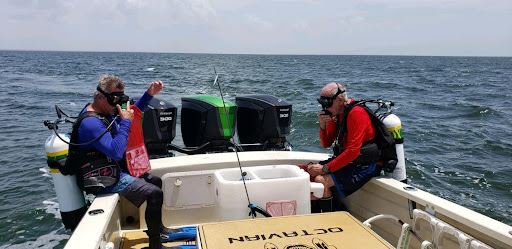by Brittany Scharf, Marine Agent III with UF/IFAS Extension Hernando County
Over the last year, a team of volunteers worked hard to help give the bay scallop population off Hernando’s coast a much-needed boost. These volunteers go by the name of “Scallop Sitters.” Their efforts have not gone unnoticed by visitors and residents scalloping this summer. Pre-season scallop surveys showed Hernando to have the highest scallop abundance recorded in almost ten years. That’s excellent news for those who enjoy participating in recreational scalloping and for the local ecosystem.
Florida’s bay scallops are bivalve mollusks. They have two shells joined by a hinge and use a muscle, the tasty piece harvested, to open and close the two shells. They use 42 tiny blue eyes along the outer rim of the shells to detect movement and can swim short bursts to escape predators. For food, bay scallops filter small particles from the water and use gills for breathing.
In the fall and winter months, after the recreational harvest season closes, bay scallops reproduce. Although each scallop has male and female parts, they do not release their eggs and sperm simultaneously. Fertilized eggs develop into larval scallops and drift in the water column for ten to 14 days. Eventually, the juvenile scallops will settle into seagrass beds and live out the remainder of their adult life.
Because bay scallops in Florida only live up to two years, the local population must replenish itself annually to remain stable. Changing environmental conditions, such as sedimentation and too much freshwater, can impact local populations.
Since 2017, pre-season scallop abundance surveys have indicated a decline in the number of scallops off Hernando’s coast, and harvesters have reported difficulties finding scallops. In response, UF/IFAS Scallop Sitters stepped in to help restore the bay scallops and worked hard throughout the fall and winter 2020 spawning season caring for the scallops. Wild-caught scallops were anchored in predator exclusion cages near seagrass beds throughout Hernando’s coastal waters, allowing scallops to remain close to each other, ultimately increasing the chances of released scallop eggs becoming fertilized. Once the spawning season commenced, the remaining adults were released back into the seagrass beds.
Prior to the 2021 recreational scalloping season opening in Hernando, UF/IFAS volunteers conducted the Florida Fish and Wildlife Conservation Commission’s (FWC) annual abundance surveys in Hernando County. Although not published on FWC’s website, results showed an increased abundance of scallops for the local waters. In fact, it was the highest average recorded in almost ten years. While this boost may not be solely attributable to the UF/IFAS Scallop Sitter project, increasing numbers are encouraging.
The 2021 UF/IFAS Scallop Sitter project in Hernando is now in full swing. If you see anchored cages containing scallops near seagrass beds, please do not disturb the cages and report any tampering to FWC Law Enforcement Officers. Trained and legally permitted volunteers will continue to care for the scallops throughout the 2021 spawning season. Stay tuned for next year’s results.
Note: Project was sponsored by Bayside Auto Works, Hernando Environmental Land Protectors, and Florida Fish and Wildlife Conservation Commission. All work is conducted under FWC SAL#2217. The University of Florida is an equal opportunity institution.

